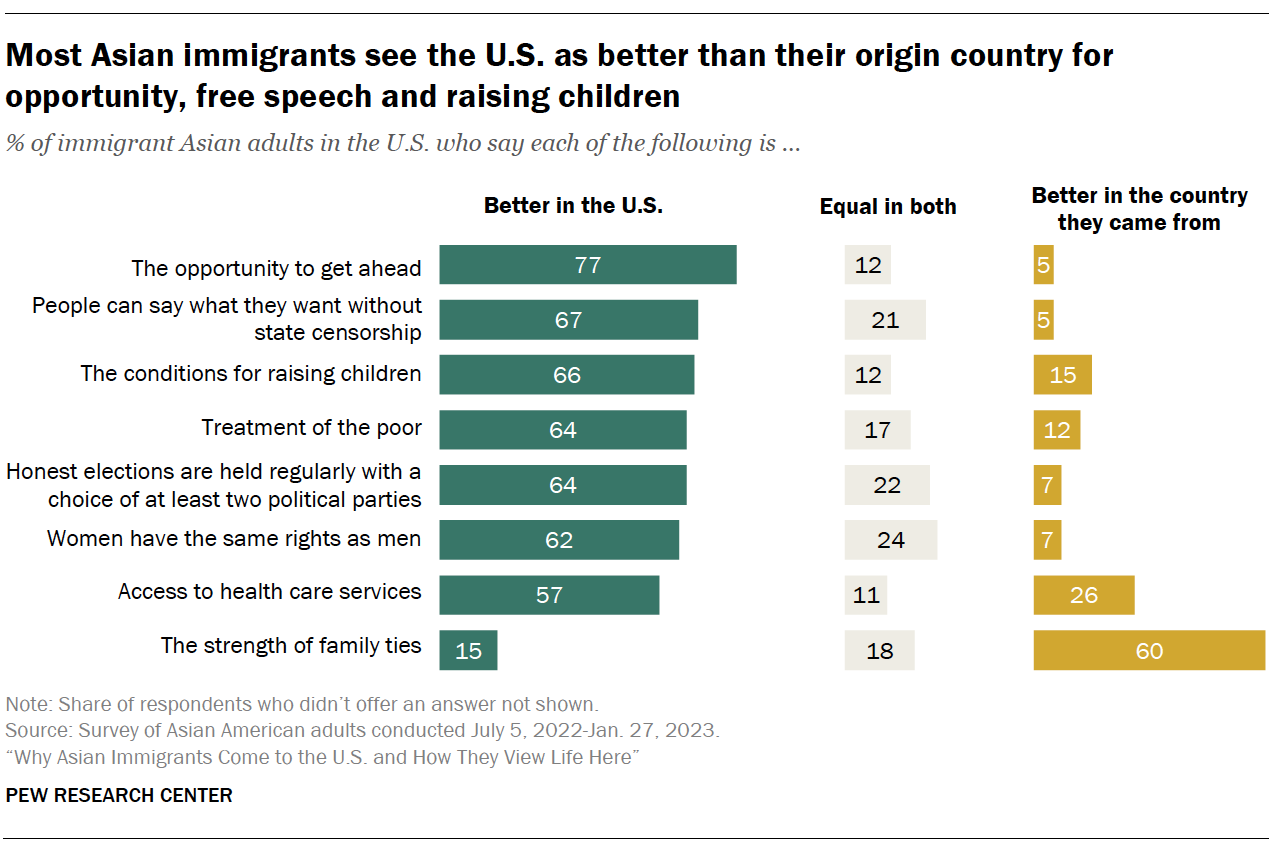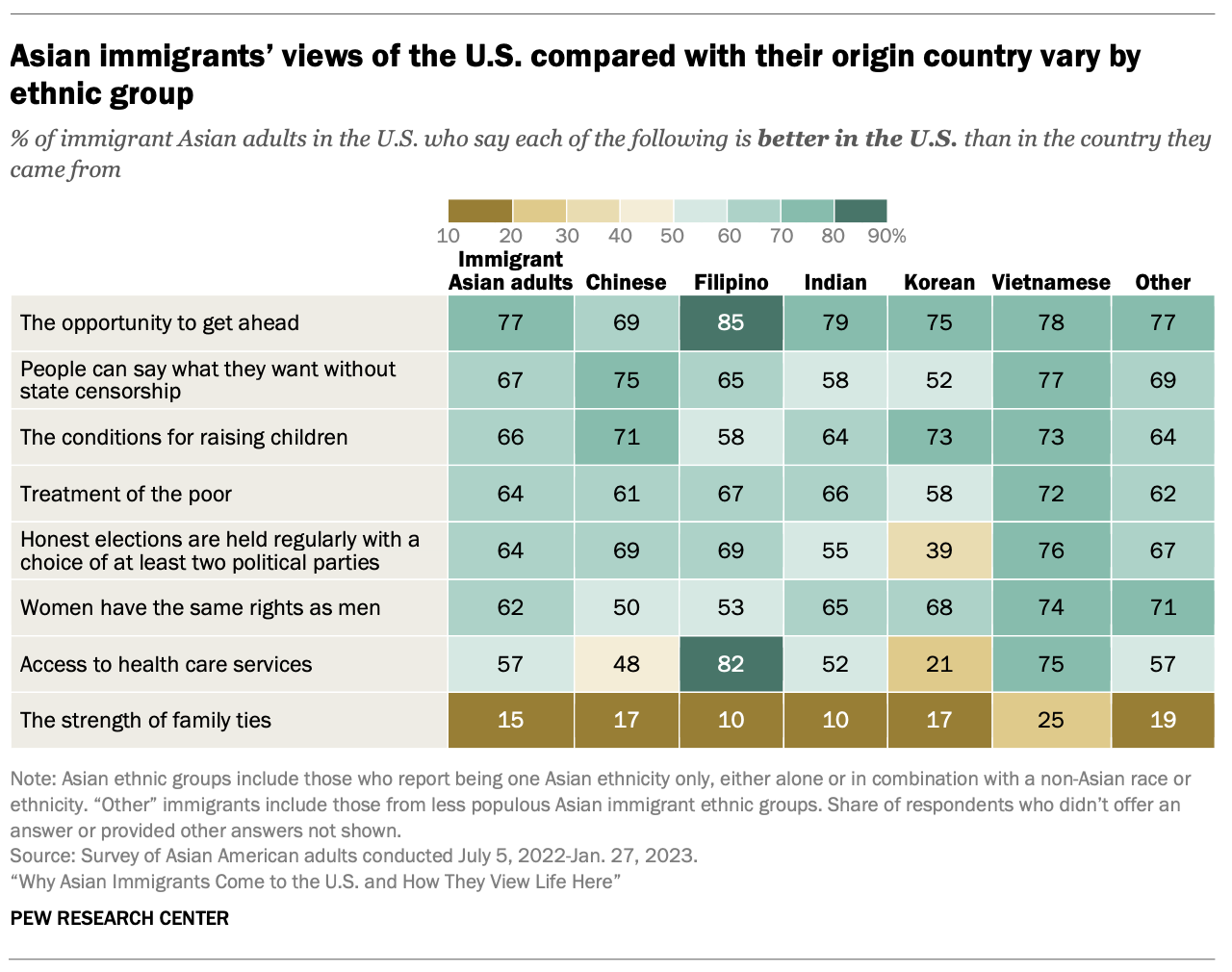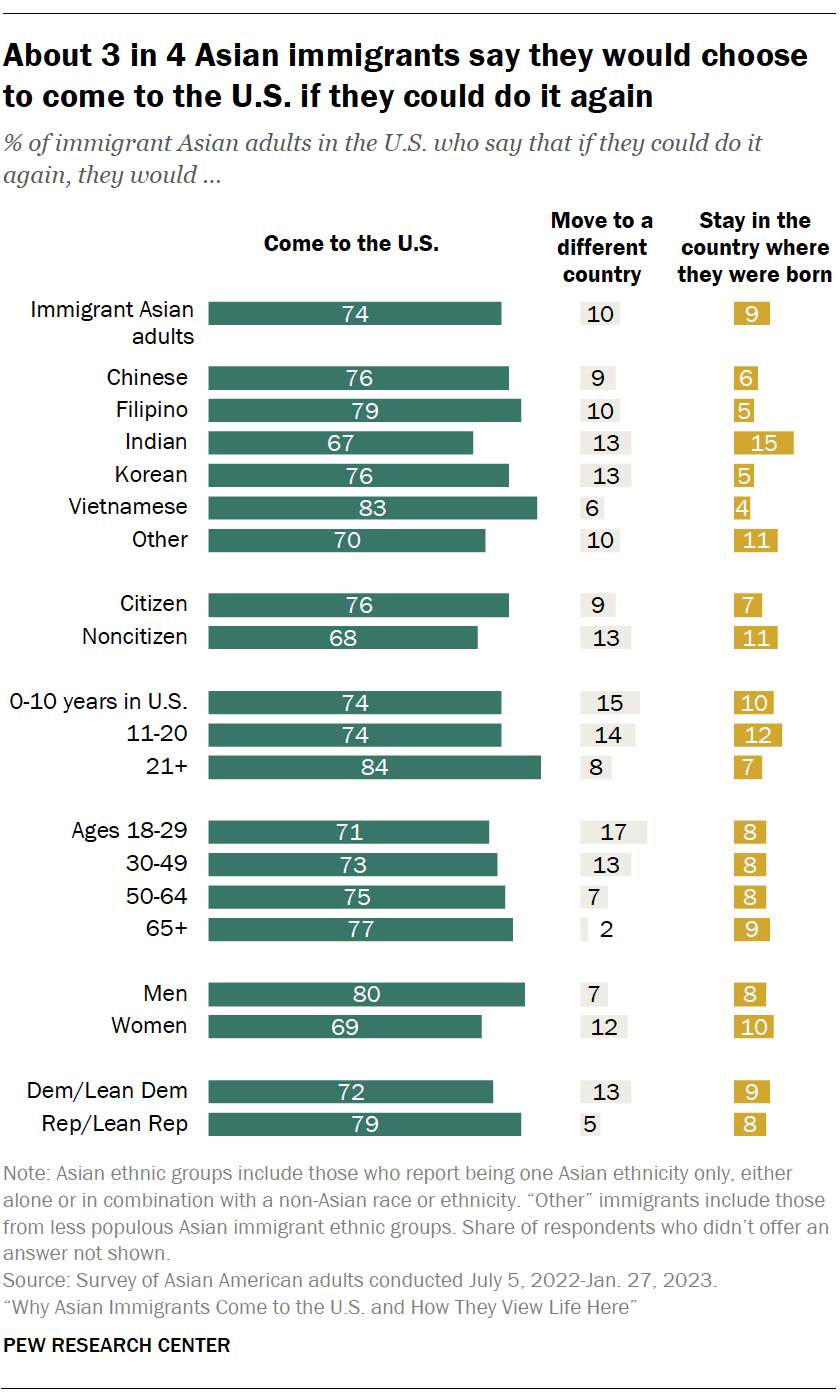The survey asked Asian immigrants about their views of life in the United States and how it compares with their country of origin. Majorities say the U.S. is better on nearly all qualities asked about in the survey, and about three-quarters say they would choose to come to the U.S. if they could do it again.
Still, the survey – conducted from July 2022 to January 2023 – found that two-thirds of Asian immigrants also feel dissatisfied with the way things are going in the country, and more than half say the country is generally headed in the wrong direction. Additionally, Asian immigrants generally view their children’s prospects in less optimistic terms than their own.
This chapter explores Asian immigrants’ attitudes about life in the U.S. today.
How Asian immigrants compare the U.S. with their origin countries
Majorities of Asian American immigrants say the U.S. is better than their origin country on nearly all qualities asked about in the survey, including the opportunity to get ahead (77%), treatment of the poor (64%) and gender equality (62%), among others.5 The one quality that a majority of Asian immigrants say is better in their country of origin than in the U.S. is the strength of family ties (60%).

By main reason for immigrating
Among Asian immigrants who came to the U.S. due to conflict, about 80% or more say the U.S. is better than their origin country on nearly all qualities asked about. The only exception is the strength of family ties: 25% say family ties are stronger in the U.S., while 48% say this is better in their origin country and 23% say it’s equal in both.
Among those who immigrated for other reasons, assessments of the U.S. are more mixed. For example, those who immigrated for educational opportunities (51%), family reunification (58%) or economic opportunities (65%) are less likely than those who immigrated due to conflict (84%) to say the U.S. is better for health care access than their country of origin.
By ethnicity
For these findings, “country of origin” is used to refer to the place respondents came from. Those of the same ethnicity may identify different places as their origin country, which can be influenced by ethnicity, birthplace, nationality, ancestry, or other social, cultural or political factors. For more information, refer to the terminology.
- 75% of Chinese immigrants say lack of state censorship is better in the U.S. than in their country of origin, but about half say the same about women’s rights (50%) and health care access (48%).
- For Filipino immigrants, about 80% or more say opportunities to get ahead and access to health care are better in the U.S. than in their origin country. Some 53% say the same about women’s rights.
- 79% of Indian immigrants say opportunities to get ahead are better in the U.S., while 52% say the same about health care access.
- Among Korean immigrants, roughly 70% or more say the U.S. is better than their origin country in opportunities to get ahead, conditions for raising children and women’s rights. On the other hand, 66% say health care access in better in their origin country than in the U.S. And 45% say regularly held honest elections are about equal in both places.
- About 75% or more of Vietnamese immigrants say the U.S. is better than their country of origin across all qualities asked about except the strength of family ties.

By citizenship
Asian immigrants who are U.S. citizens are more likely than noncitizens to say the U.S. is better than their origin country on access to health care services (63% vs. 39%) and treatment of the poor (67% vs. 57%).
For more on how Asian immigrants’ views of the U.S. compared with their country of origin varies across these subgroups, refer to Appendix A.
Asian immigrants’ views of their own standard of living, and that of their children

A large majority of Asian immigrants in the U.S. (77%) say their standard of living is much or somewhat better than their parents’ standard of living when they were the same age. Meanwhile, 13% say their standard of living is much or somewhat worse, and 9% say it’s about the same as that of their parents.
The survey also finds Asian immigrants are less optimistic about their children’s prospects than their own. Among Asian immigrants who have children, about half (48%) say their children’s standard of living will be much or somewhat better than their own.6 Some 37% say their children’s standard of living will be much or somewhat worse, and 15% say it will be about the same as their own.
Among Asian immigrants with children, expectations about the next generation’s standard of living vary by:
- Ethnicity: More than half of Vietnamese immigrants (58%) say their children’s standard of living will be better than their own, a higher share than among other ethnic groups.
- Citizenship: 58% of Asian immigrants who are not U.S. citizens say their children’s standard of living will be better, compared with 44% of those who have U.S. citizenship.
- Years in the U.S.: 64% of Asian immigrants who have lived in the U.S. for 10 years or less say their children’s standard of living will be better than their own, versus 49% of those in the U.S. for 11 to 20 years and 38% of those in the U.S. for more than 20 years.
- Education: Asian immigrants without a college degree are more likely than those with a bachelor’s degree or higher to say their children’s standard of living will be better than their own.
Overall, immigrant Asian adults have a more positive outlook about their own and their children’s prospects than U.S.-born Asian adults:
- 77% of Asian immigrants say their standard of living is better than that of their parents, compared with 60% of U.S.-born Asian adults who hold the same view.
- 48% of Asian immigrants with children say their children’s standard of living will be better than their own, compared with 29% of U.S.-born Asian adults with children.
Indeed, 52% of U.S.-born Asian parents say that when their children are the age they are now, their children’s standard of living will be worse than their own – a higher share than among Asian immigrant parents who say the same (37%).
If given the chance to do it again, would Asian immigrants still come to the U.S.?

About three-quarters of Asian immigrants (74%) say that if they had the chance to do it again, they would still choose to come to the U.S.7 But not all would do this – roughly one-in-ten each say they would move to a different country (10%) or stay in the country where they were born (9%).
While majorities of Asian immigrants across demographic subgroups say they would come to the U.S. again, there are some differences by:8
- Ethnicity: 83% of Vietnamese immigrants say they would come to the U.S. again. Meanwhile, 67% of Indian immigrants say the same.
- Age: About three-quarters of Asian immigrants across age groups say that if they had another chance, they would come to the U.S. But 17% of Asian immigrants under 30 say they would move to a different country, compared with only 2% of those 65 and older.
- Gender: 80% of Asian immigrant men say they would come to the U.S. if they could do it again, while 69% of immigrant women say the same.
Do Asian immigrants think the lives of other Asian Americans, other immigrants and people of their ethnicity affect their own?
Aside from asking about their personal immigration experiences, the survey also asked Asian immigrants whether they think their lives are linked to the lives of other Asians in the U.S., immigrants in the U.S. (regardless of racial or ethnic identity), or people of their ethnic group around the world. About half or more of Asian immigrants say that what happens to each of these groups affects what happens in their own lives a lot or some.
By ethnicity
Chinese, Indian and Korean immigrants are among those most likely to say that what happens to the groups asked about impacts their own lives:
- Asians in the U.S.: Roughly two-thirds of Korean (66%) and Chinese (64%) immigrants say that what happens to other Asian Americans impacts their own lives a lot or some, higher than the shares among other ethnic groups.
- Immigrants in the U.S.: Indian immigrants are among the most likely to say what happens to immigrants – of any racial or ethnic background – living in the U.S. impacts their own lives at least some (62%). Meanwhile, Vietnamese immigrants are among the least likely to say this (45%).
- People of their ethnic group around the world: Majorities of Korean (60%), Chinese (58%) and Indian (55%) immigrants say what happens to people of their ethnic group globally affect what happens in their own lives. Smaller shares of Filipino (43%) and Vietnamese (42%) immigrants say the same.
By age, education and citizenship
Immigrants who are younger, have more education and do not hold U.S. citizenship are also more likely to say their lives are linked with each of the groups asked about.

By nativity
Overall, immigrant and U.S.-born Asian adults share similar views on how connected their lives are to the lives of others.
- Asians in the U.S.: 57% of Asian immigrants and 64% of U.S.-born Asian adults say that what happens to Asians in the U.S. affects what happens in their own lives a lot or some.
- Immigrants in the U.S.: 55% of Asian immigrants and 50% of U.S.-born Asian adults say that what happens to immigrants living in the U.S. affects their own lives.
- People of their ethnic group around the world: 52% of Asian immigrants and 50% of U.S.-born Asian adults say what happens to people of their ethnic group around the world affects what happens in their lives.




